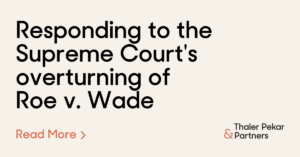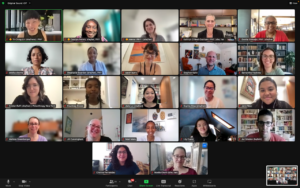4 min read
The Glory of Low Expectations

Want to speak with the opposition? Lower your expectations!
At the least, people want to be heard. At the most, this is the goal we should set for initially bringing together people who hold opposing views.
We are seeing increasing attempts to unite “red and blue” and “conservatives and liberals” in conversation. We’ve even seen commercial brands exploit this constructed commingling (including the infamous “Worlds Apart” advertising campaign from Heineken).
Whether propelled by noble or purely financial intentions, these one-off efforts to bring self-identified opposites together can be precious and inauthentic, even harmful. A quick quest toward common ground can be dangerous.
When promoted as conversations among people on opposing sides, it is too easy for conversation to become confrontation.
These efforts can also be exercises in self-righteousness, placation, and exploitation. They can promote false equivalencies. Despite, or perhaps because of people proudly self-identifying with a pre-determined “side”, these efforts can become exercises in performance, rather than emergence.
Superficial conversations cloaked in “uniting” supposed opposites can also pressure or guilt participants into coming to agreement. It is easy to confuse civility with passivity, and passivity with agreement. Under the pretense of such performative civility, it is too easy to acquiesce to abuse and denials of human rights.
Of course, good can result. At the least, people can be heard.
So, what does it take for people to feel heard in such a limited, one-time context? Low expectations, limited intent, and fairness.
Low Expectations
Most likely, one gathering alone is not going to change the world, American politics, or even your own beliefs and biases. Do not influence or inhibit conversation by suggesting that a constructed event will result in significant change.
Limited Intent
Incensed by what I see as mistaken and harmful attempts at forced conversation, I’ve asked people from all walks of life what they hope to achieve by engaging in attempts to unite opposites. Everyone responded that the goal was the discovery of “shared values”.
Yet the discovery of shared values is limiting. There are many people who share a value of raising children with unconditional love; of valuing the role of a spiritual presence in one’s life; of sharing the value of hard work and fiscal responsibility. How we wish to see those values manifest — and how we ourselves embody those values — may be the root of our discord.
Perhaps the best and most limited of intents is also the most seemingly self-centered: set your own intent to stay calm, to listen, and to exit if you find yourself riled.
Fairness
Simply let people be heard.
It is humane to offer someone the time, space, and attention allowing them to share a story of personal experience without fear of assumptions being made about them.
We can move past data and stereotypes to respectfully hearing people’s experiences. We can refrain from inferring and assigning intention and motives. We can listen without aiming to confirm assumptions or to self-congratulate for “spending time with the other side”.
Our own experiences and the internalization of our values may be so divergent with other’s that we may never reach true understanding. Rushing to reach common ground pushes past these extraordinary and beautiful differences. When we focus on similarities, we discredit, if not outright disdain, differences. And we need to celebrate difference as well as commonality.
So, forget about common ground. Don’t push for folks to “get on the same page”.
Allow other people to be heard, and you yourself may be heard. It may not result in significant change, or in your understanding, or being understood. But, at the least, we may stop being surprised by what people say and do. That is the glory of low expectations.
Thaler Pekar & Partners is internationally-recognized for its deep expertise in narrative, story, and communication. Both the BBC and the Smithsonian Institution have hailed the founder, Thaler Pekar, as one of the world’s leading experts on institutional storytelling.
For 14 years, the team at Thaler Pekar & Partners has advised visionaries on being understood and influential. Our trademarked communication processes — Heart, Head, & Hand®, Engagement Equation® and Invitational Incline® — provide leaders with the confidence to speak, listen, and be heard, and sustain them in offering effective motivation. As a result, teams are more productive, audiences are more receptive, and visibility increases.
Our award-winning work ranges from gathering 178 oral histories across four continents and six countries for Chuck Feeney’s The Atlantic Philanthropies; to finding and refining stories about integrity for Novartis senior leadership; to coaching a mainstage TED Talker; and to developing a communication and story skills academy for L’Oreál International Educators and Customer Representatives.







